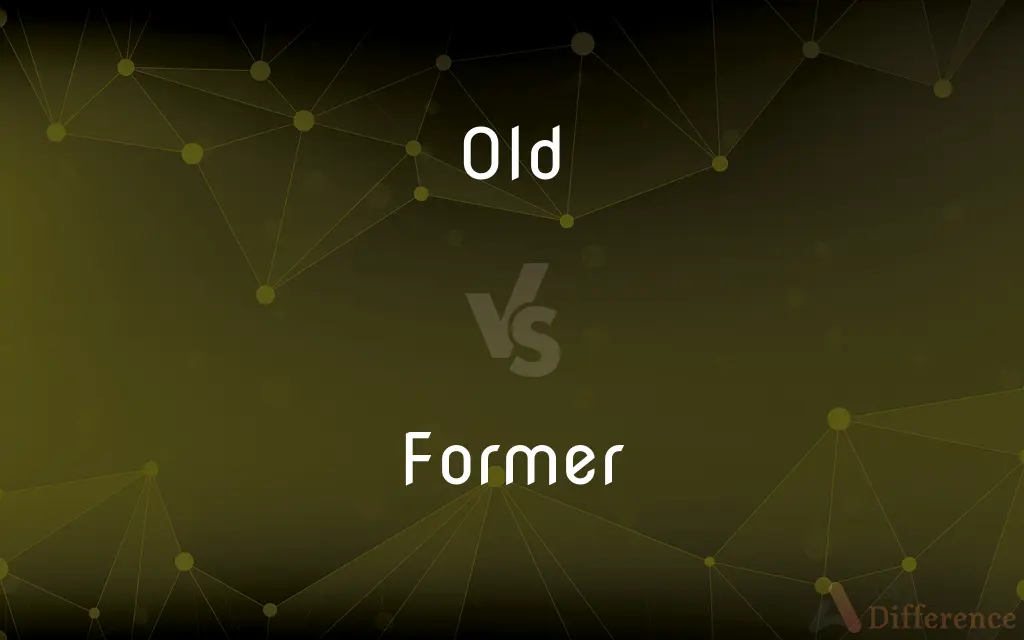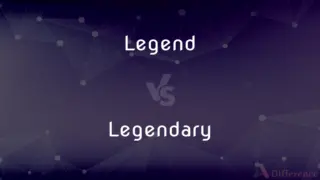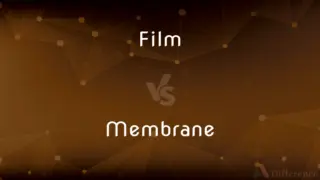Old vs. Former — What's the Difference?
By Maham Liaqat & Urooj Arif — Updated on March 8, 2024
Old refers to something that has existed for a long time or is aged, while former implies something that was once the case but is no longer.

Difference Between Old and Former
Table of Contents
ADVERTISEMENT
Key Differences
Old and former both relate to the past, but in different contexts. Old refers to age or the passage of time, indicating something that has been around for a long period. It often carries implications of being outdated or worn. For example, an old building might need repairs due to its age. Former, on the other hand, points to a previous state, role, or position that is no longer current. A former president, for instance, is someone who once held the office but does not anymore.
When discussing objects or entities, old emphasizes the aspect of age and the effects time may have on them, such as wear, deterioration, or antiquity. An old artifact in a museum, for instance, is valued for its historical significance and the era it represents. Former, however, is used to denote a prior status or function that has since changed, without necessarily implying anything about the age of the subject. A former warehouse converted into apartments highlights a change in use, not the building's age.
In terms of people, old can describe someone's age, suggesting they are in the later stages of life, often associated with wisdom or experience. It can also signify longstanding relationships or acquaintances, like an old friend. Former, when referring to people, indicates a previous role or relationship that has since ended or changed, such as a former colleague who has moved to a different job.
Culturally, old can have both positive and negative connotations, sometimes revered for tradition and history, and other times seen as obsolete or outmoded. In contrast, former is generally neutral, simply marking a transition from one state to another without an inherent value judgment.
The terminology used in describing historical periods or artifacts also differs. Old is used to signify the age of an item, such as old manuscripts that are valuable due to their historical age. Former, however, is used in historical contexts to denote previous conditions or statuses, such as former empires, which indicates political entities that existed at one time but no longer do.
ADVERTISEMENT
Comparison Chart
Definition
Pertaining to something with a long history or high age.
Indicating something that was previously the case.
Context
Age, time, wear, and antiquity.
Previous roles, statuses, or conditions.
Usage
Describes age, longevity, and effects of time.
Describes a past state or position that has changed.
Connotation
Can be both positive (wisdom, tradition) and negative (outdated, worn).
Generally neutral, indicating change or transition.
Examples in Sentences
"The old castle has stood for centuries."
"The former champion now coaches young athletes."
Compare with Definitions
Old
Pertaining to something with considerable age or from a distant past.
The old tree in the park has become a landmark over the years.
Former
Denoting a previous position or role held by a person.
The former CEO now serves as a consultant for the company.
Old
Denoting something familiar or long-established.
We visited our old neighborhood to reminisce about childhood memories.
Former
Referring to something that previously existed or was the case.
The building, a former factory, has been converted into apartments.
Old
Referring to a person advanced in years.
The old professor shared his wisdom with students.
Former
Describing the first of two mentioned things.
In the debate between liberty and security, the former is my choice.
Old
Exhibiting signs of age or wear.
She carefully preserved her old family photographs.
Former
Indicating a previous condition or state.
The artist's former studio is now a gallery.
Old
Describing something that is no longer in use or has been replaced.
They finally replaced the old computer with a new one.
Former
Used to specify something that has changed its nature or identity.
The park was a former industrial site.
Old
Having lived for a long time; no longer young
The old man lay propped up on cushions
Former
A former is an object, such as a template, gauge or cutting die, which is used to form something such as a boat's hull. Typically, a former gives shape to a structure that may have complex curvature.
Old
Belonging to the past; former
Valuation under the old rating system was inexact
Former
One that forms; a maker or creator
A former of ideas.
Old
Of a specified age
A seven-month-old baby
He was fourteetn years old
Former
A member of a school form
A fifth former.
Old
Used to express affection, familiarity, or contempt
Good old Mum
I didn't like playing with silly old dolls
Former
The first of two persons or things mentioned
"The army was pulling itself together, the government was coming apart. The success of the former was continually imperiled by the failure of the latter" (Garry Wills).
Old
Having lived or existed for a relatively long time; far advanced in years or life.
Former
Relating to or taking place in the past
In former times.
Old
Relatively advanced in age
Pamela is our oldest child.
Former
Having been so in the past
A former ambassador.
His former boss.
Old
Made long ago; in existence for many years
An old book.
Former
Being the first of two mentioned.
Old
Of or relating to a long life or to people who have had long lives
A ripe old age.
Former
Previous.
A former president;
The former East Germany
Old
Having or exhibiting the physical characteristics of age
A prematurely old face.
Former
First of aforementioned two items. Used with the, often without a noun.
The former is a good idea but the latter is not.
We have two cars, a red one and a blue one. We won the former on a game show.
Old
Having or exhibiting the wisdom of age; mature
A child who is old for his years.
Former
Someone who forms something; a maker; a creator or founder.
Dave was the former of the company.
Old
Having lived or existed for a specified length of time
She was 12 years old.
Former
An object used to form something, such as a template, gauge, or cutting die.
The brick arch was built using a wooden former.
Old
Exhibiting the effects of time or long use; worn
An old coat.
Former
Someone in, or of, a certain form (class).
Old
Known through long acquaintance; long familiar
An old friend.
Former
One who forms; a maker; a creator.
Old
Skilled or able through long experience; practiced
He is an old hand at doing home repairs.
Former
A shape around which an article is to be shaped, molded, woven wrapped, pasted, or otherwise constructed.
Old
Belonging to a remote or former period in history; ancient
Old fossils.
Former
Preceding in order of time; antecedent; previous; prior; earlier; hence, ancient; long past.
For inquire, I pray thee, of the former age.
The latter and former rain.
Old
Belonging to or being of an earlier time
Her old classmates.
Former
Near the beginning; preceeding; as, the former part of a discourse or argument.
Old
Often Old Being the earlier or earliest of two or more related objects, stages, versions, or periods.
Former
Earlier, as between two things mentioned together; first mentioned.
A bad author deserves better usage than a bad critic; a man may be the former merely through the misfortune of an ill judgment; but he can not be latter without both that and an ill temper.
Old
Having become slower in flow and less vigorous in action. Used of a river.
Former
The first of two or the first mentioned of two;
Tom and Dick were both heroes but only the former is remembered today
Old
Having become simpler in form and of lower relief. Used of a landform.
Former
Referring to the first of two things or persons mentioned (or the earlier one or ones of several);
The novel was made into a film in 1943 and again in 1967; I prefer the former version to the latter one
Old
Used as an intensive
Come back any old time. Don't give me any ol' excuse.
Former
Belonging to some prior time;
Erstwhile friend
Our former glory
The once capital of the state
Her quondam lover
Old
Used to express affection or familiarity
Good ol' Sam.
Former
(used especially of persons) of the immediate past;
The former president
Our late President is still very active
The previous occupant of the White House
Old
An individual of a specified age
A five-year-old.
Former
Of the distant past;
The early inhabitants of Europe
Former generations
In other times
Old
Old people considered as a group. Used with the
Caring for the old.
Old
Former times; yore
In days of old.
Old
Of an object, concept, relationship, etc., having existed for a relatively long period of time.
An old abandoned building
An old friend
Old
Of a living being, having lived for most of the expected years.
A wrinkled old man
Old
Of a perishable item, having existed for most of, or more than, its shelf life.
An old loaf of bread
Old
Of a species or language, belonging to a lineage that is distantly related others
The ginkgo is one of the oldest living trees
Basque is the oldest language in Europe
Old
Having been used and thus no longer new or unused.
I find that an old toothbrush is good to clean the keyboard with.
Old
Having existed or lived for the specified time.
How old are they? She’s five years old and he's seven. We also have a young teen and a two-year-old child.
My great-grandfather lived to be a hundred and one years old.
Old
(heading) Of an earlier time.
Old
Former, previous.
My new car is not as good as my old one.
A school reunion for Old Etonians
Old
That is no longer in existence.
The footpath follows the route of an old railway line.
Old
Obsolete; out-of-date.
That is the old way of doing things; now we do it this way.
Old
Familiar.
When he got drunk and quarrelsome they just gave him the old heave-ho.
Old
(UK) Being a graduate or alumnus of a school, especially a public school.
Old
Tiresome after prolonged repetition.
Your constant pestering is getting old.
Old
Said of subdued colors, particularly reds, pinks and oranges, as if they had faded over time.
Old
A grammatical intensifier, often used in describing something positive, and combined with another adjective.
We're having a good old time.
My next car will be a big old SUV.
My wife makes the best little old apple pie in Texas.
Any old
Old
(obsolete) Excessive, abundant.
Old
|invariable plural only}} People who are old; old beings; the older generation, taken as a group.
A civilised society should always look after the old in the community.
Old
(slang) A person older than oneself, especially an adult in relation to a teenager.
Old
One's parents.
I had to sneak out to meet my girlfriend and tell the olds I was going to the library.
Old
A typically dark-coloured lager brewed by the traditional top-fermentation method.
Old
Open country.
Old
Not young; advanced far in years or life; having lived till toward the end of the ordinary term of living; as, an old man; an old age; an old horse; an old tree.
Let not old age disgrace my high desire.
The melancholy news that we grow old.
Old
Not new or fresh; not recently made or produced; having existed for a long time; as, old wine; an old friendship.
Old
Formerly existing; ancient; not modern; preceding; original; as, an old law; an old custom; an old promise.
Old
Continued in life; advanced in the course of existence; having (a certain) length of existence; - designating the age of a person or thing; as, an infant a few hours old; a cathedral centuries old.
And Pharaoh said unto Jacob, How old art thou?
Old
Long practiced; hence, skilled; experienced; cunning; as, an old offender; old in vice.
Vane, young in years, but in sage counsel old.
Old
Long cultivated; as, an old farm; old land, as opposed to new land, that is, to land lately cleared.
Old
Worn out; weakened or exhausted by use; past usefulness; as, old shoes; old clothes.
Old
More than enough; abundant.
If a man were porter of hell gate, he should have old turning the key.
Old
Aged; antiquated; hence, wanting in the mental vigor or other qualities belonging to youth; - used disparagingly as a term of reproach.
Old
Old-fashioned; wonted; customary; as of old; as, the good old times; hence, colloquially, gay; jolly.
Old
Used colloquially as a term of cordiality and familiarity.
Old
Past times (especially in the phrase `in days of old')
Old
(used especially of persons) having lived for a relatively long time or attained a specific age; especially not young; often used as a combining form to indicate an age as specified as in `a week-old baby';
An old man's eagle mind
His mother is very old
A ripe old age
How old are you?
Old
Of long duration; not new;
Old tradition
Old house
Old wine
Old country
Old friendships
Old money
Old
Of an earlier time;
His old classmates
Old
(used for emphasis) very familiar;
Good old boy
Same old story
Old
Lacking originality or spontaneity; no longer new;
Moth-eaten theories about race
Old
Just preceding something else in time or order;
The previous owner
My old house was larger
Old
Of a very early stage in development;
Old English is also called Anglo Saxon
Old High German is High German from the middle of the 9th to the end of the 11th century
Old
Old in experience;
An old offender
The older soldiers
Old
Used informally especially for emphasis;
A real honest-to-god live cowboy
Had us a high old time
Went upriver to look at a sure-enough fish wheel
Common Curiosities
How is "former" commonly used?
Former is commonly used to denote a previous state, role, or condition that has changed.
What does "old" typically refer to in general usage?
Old typically refers to something with considerable age, history, or showing signs of wear and time.
Can "old" have positive connotations?
Yes, "old" can have positive connotations, such as wisdom, tradition, and value due to historical significance.
Can "old" imply obsolescence?
Yes, "old" can imply obsolescence or being outmoded, particularly in the context of technology or trends.
Can "former" apply to places or locations?
Yes, "former" can apply to places or locations that have undergone a significant change in purpose or character.
Is "former" a neutral term?
Yes, "former" is generally a neutral term that marks a transition or change without an inherent value judgment.
How might "old" and "former" be used differently when referring to a person?
"Old" refers to someone's age or a longstanding relationship, whereas "former" indicates a previous role or position held by the person.
Does "former" imply anything about the age of a subject?
No, "former" does not imply anything about the age of a subject, only its past state or role.
How does the use of "old" in describing buildings compare to "former"?
In describing buildings, "old" focuses on the age and possibly the historical value, whereas "former" highlights a past function or use that has changed.
How do "old" and "former" relate to historical artifacts?
"Old" emphasizes the age and historical period of artifacts, while "former" refers to their previous use, function, or context.
How does "old" relate to relationships or acquaintances?
"Old" can describe longstanding relationships or acquaintances, suggesting a deep or long-established connection.
How might "old" be used in a cultural context?
In a cultural context, "old" can be used to refer to traditions, practices, or items that are cherished for their historical and enduring value.
Can an object be both old and former in different contexts?
Yes, an object can be both old in terms of age or antiquity and former if it had a different use or function in the past.
Does "former" always relate to a downgrade or demotion?
No, "former" does not necessarily relate to a downgrade or demotion; it simply indicates a change from a previous state or role.
How does the concept of "former" apply to political or organizational roles?
In political or organizational contexts, "former" denotes individuals who once held certain positions or roles but no longer do, without indicating the reasons for the change.
Share Your Discovery

Previous Comparison
Legend vs. Legendary
Next Comparison
Film vs. MembraneAuthor Spotlight
Written by
Maham LiaqatCo-written by
Urooj ArifUrooj is a skilled content writer at Ask Difference, known for her exceptional ability to simplify complex topics into engaging and informative content. With a passion for research and a flair for clear, concise writing, she consistently delivers articles that resonate with our diverse audience.














































